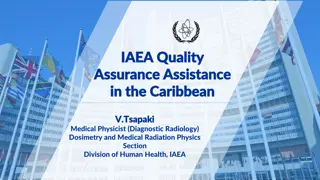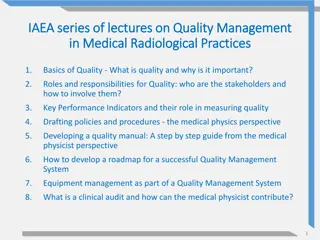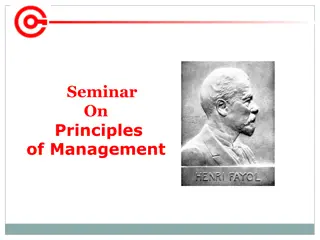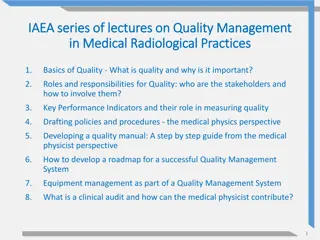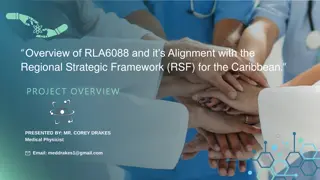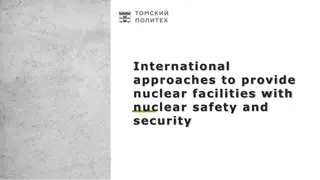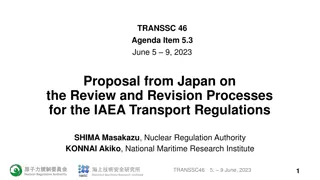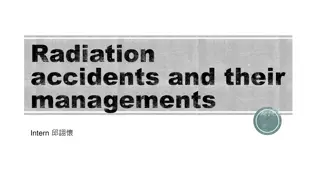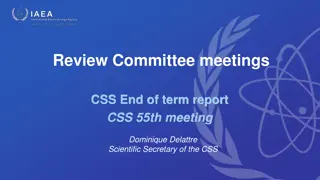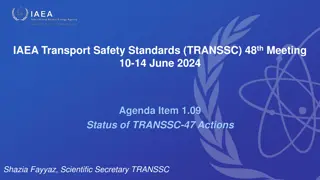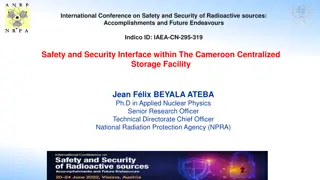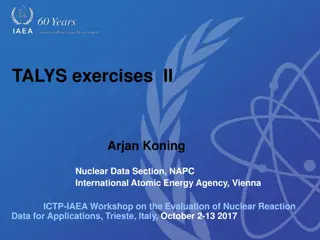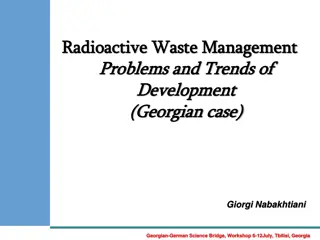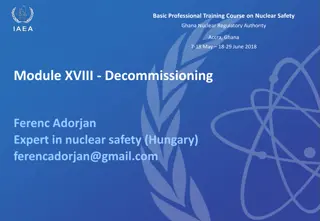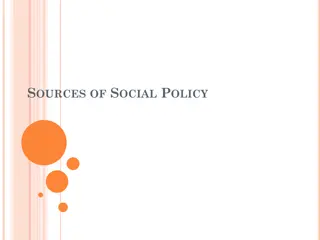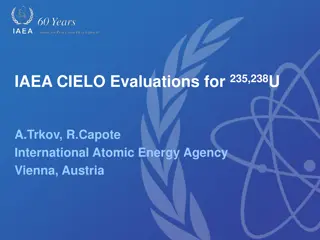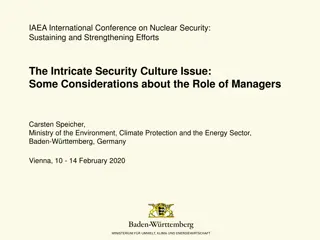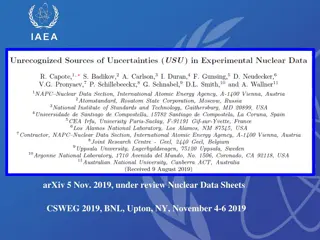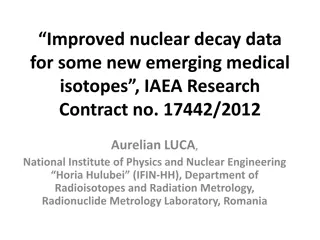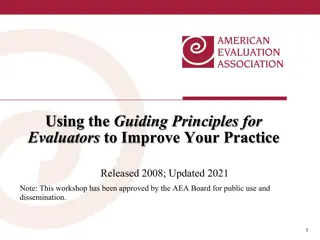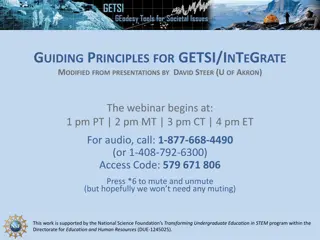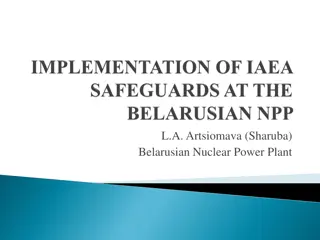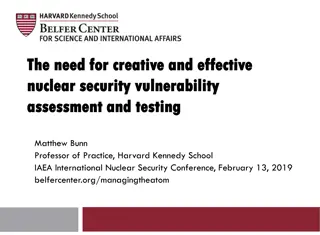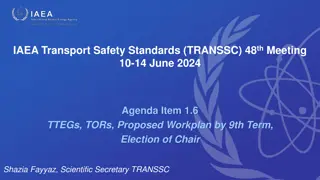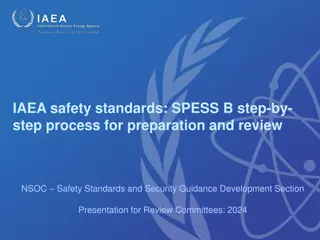Integrated Solutions for Sustainable Energy and Water: Building Capacities and Analytical Tools
Explore how integrated energy and water solutions can support sustainable cities and human settlements. Learn about the critical role of energy, water, land, and climate in achieving SDGs. Discover the Capacity Building Program for Integrated Energy Planning offered by IAEA to assist Member States.
9 views • 11 slides
Principles of the Ghana Civil Service Code of Conduct
The Code of Conduct for the Ghana Civil Service, outlined by Elizabeth Obeng-Yeboah, emphasizes principles such as abiding by the constitution and laws with dignity, integrity, and professionalism. It sets standards for conduct, avoiding conflicts of interest, maintaining political neutrality, and u
1 views • 34 slides
IAEA Quality Assurance Assistance in the Caribbean - V. Tsapaki, IAEA Medical Physicist
Serving as the global focal point for nuclear cooperation, the International Atomic Energy Agency (IAEA) supports Member States in utilizing nuclear science and technology for sustainable development. The Technical Cooperation Programme aims at building capacities for safe nuclear technology use. Co
3 views • 18 slides
Academic Freedom and Shared Governance in Higher Education
Academic Freedom and Shared Governance are foundational principles advocated by the American Association of University Professors (AAUP) to ensure educators have the freedom to explore, research, teach, and discuss without censorship. These principles empower educators to enhance student learning an
0 views • 9 slides
IAEA series of lectures on Quality Management in Medical Radiological Practices
Quality management in medical radiological practices is crucial for ensuring the delivery of high-quality healthcare services. This series of lectures covers topics such as the basics of quality, roles and responsibilities, key performance indicators, drafting policies, developing a quality manual,
4 views • 54 slides
Essential Principles of Management Discussed in Seminar
Explore the foundational principles of management discussed in a seminar on principles of management. Delve into topics such as division of work, authority, discipline, unity of command, and unity of direction as outlined by Henri Fayol. Gain insights into the importance of these principles for effe
0 views • 22 slides
Comprehensive Insights into Quality Management in Medical Radiological Practices
Explore a series of lectures by the IAEA focusing on quality management in medical radiological practices, covering essential topics such as the basics of quality, key performance indicators, drafting policies, equipment management, and more. Gain a thorough understanding of KPIs, their significance
0 views • 48 slides
Enhancing Healthcare in the Caribbean through RLA6088 Alignment
Overview of RLA6088's alignment with the Regional Strategic Framework (RSF) for the Caribbean presented by Mr. Corey Drakes, focusing on addressing the pressing human health needs and problems in the region. The RSF identifies key areas for technical cooperation with IAEA-CARICOM Member States, emph
0 views • 24 slides
International Approaches to Enhance Nuclear Safety and Security
Understanding the concepts of nuclear safety and security, their differences, and the importance of establishing a robust nuclear security culture are essential for safeguarding nuclear facilities. The International Atomic Energy Agency (IAEA) plays a significant role in promoting nuclear safety and
1 views • 10 slides
International Law of War: Nuremberg Principles and Accountability
The Nuremberg Principles, derived from the trials of Nazi officials for war crimes, establish accountability in international law. These principles hold individuals responsible for committing acts considered crimes under international law, regardless of their position or orders received. The assumpt
2 views • 22 slides
Promoting Ethical Principles in Social Science Research
Explore the challenges and strategies for translating and applying ethical principles, especially in emergency contexts. Learn key questions in social science research and how to ensure information contributes to community actions. Understand the importance of considering ethical principles in all w
0 views • 21 slides
Review and Revision Processes for IAEA Transport Regulations Proposal
The proposal from Japan advocates for a 2-year revision process for the IAEA Transport Regulations to align with international standards. The aim is quick implementation of new knowledge, reflecting changes from international regulations and standards, and efficient problem-solving. The process invo
0 views • 20 slides
Study Guide for Principles of Management Course at Africa Research University (ARU)
Welcome to Africa Research University (ARU)! This study guide is designed to help you navigate through the Principles of Management course (Course Code: PRM4) at ARU. It provides an introduction to the course content, emphasizing the importance of developing management skills to effectively lead and
1 views • 40 slides
Key Principles of Insurance Explained with Visuals
Understanding the principles of insurance is crucial for both insurance seekers and companies. The principles include Utmost Good Faith, Insurable Interest, Indemnity, Contribution, and Subrogation. These principles ensure transparency, fairness, and protection for policyholders. Visual representati
0 views • 6 slides
Principles of Training: Overload, Specificity, and Progression
Principles of training encompass overload, specificity, and progression. Overload requires doing more than usual, specificity involves tailored activities, and progression ensures gradual advancement. These principles are vital for improving fitness levels safely and effectively, emphasizing the nee
8 views • 17 slides
Managing Radiation Accidents: Challenges and Strategies
Radiation accidents present significant challenges in terms of managing exposure and mitigating consequences. International organizations like the IAEA and WHO provide guidelines for handling such incidents. Possible scenarios include dispersal of radioactive substances in various contexts, such as
0 views • 35 slides
Recommendations and Progress Report from Review Committee Meetings - CSS 55th Meeting
The 55th meeting of the Review Committee focused on ensuring safety standards are up-to-date for emerging challenges. Recommendations include structuring IAEA safety standards, obtaining feedback systematically, and monitoring progress through a dashboard. Implementation progress involves knowledge
0 views • 37 slides
IAEA TRANSSC-47 Actions Status Summary
The status of actions arising from IAEA TRANSSC-47 meeting includes updates on various agenda items such as advisory material for safe transport of radioactive material, consultation with relevant members, integration of values, coordination for meetings, review process proposals, drafting of terms
3 views • 4 slides
Safety and Security Measures at Cameroon's Centralized Storage Facility
The Centralized Storage Facility in Cameroon, established to manage disused sealed radioactive sources, incorporates safety and security measures in an integrated manner. The facility consists of ISO containers, alarm monitoring stations, and implements security enhancements based on IAEA guidelines
0 views • 15 slides
Effective Partnership and Mutual Accountability in Nutrition Clusters
The content discusses the minimum commitments needed for participation in Nutrition Clusters, explains the Principles of Partnership, and explores how these principles can enhance coordination and accountability to affected populations. It emphasizes partner commitments, such as leadership, mainstre
0 views • 7 slides
Nuclear Reaction Data Workshop Highlights
Explore the TALYS exercises, sample cases, and project insights from the ICTP-IAEA Workshop on Nuclear Data Evaluation. Dive into subactinide fission, neutron interactions with different elements, and resonance parameter reconstruction with TALYS-1.8. Discover the intricacies of fission barriers, Ma
0 views • 13 slides
Challenges in Radioactive Waste Management: A Case Study of Georgian-German Science Collaboration
This document delves into the management of radioactive waste, highlighting the problems, trends, and development in the Georgian context. It explores the principles set by the IAEA for waste management, emphasizing the protection of human health, environment, and future generations. The discussion
0 views • 21 slides
Comprehensive Training on Nuclear Decommissioning Procedures
This training course, conducted by the Ghana Nuclear Regulatory Authority, focuses on the decommissioning process of nuclear facilities. The content covers definitions, strategies, IAEA standards, and management aspects related to decommissioning. Key topics include decommissioning processes, planni
0 views • 64 slides
Overview of Fundamental Principles of Space Law and Outer Space Treaties
The content discusses the fundamental principles of space law highlighted at the United Nations Space Law Conference 2020, focusing on key treaties such as the Outer Space Treaty of 1967 and associated rights, duties, and obligations of states in space exploration and use, including non-appropriatio
0 views • 16 slides
Overview of Directive Principles of State Policy in Indian Constitution
Directive Principles of State Policy (DPSP) in the Indian Constitution encompass social, economic, and political programs aimed at realizing ideals of justice, liberty, equality, and fraternity. They are non-justiciable but guide the state in legislative matters. Classified into Socialistic, Gandhia
0 views • 24 slides
IAEA CIELO Evaluations for Uranium Isotopes & Criticality Benchmarks Report
This report discusses the IAEA CIELO evaluations for uranium isotopes, focusing on the impact of Standards_2016 on criticality predictions, adjustments in nuclear model calculations using the Empire code, and incorporation of experimental data to enhance performance in integral benchmarks.
0 views • 7 slides
Nuclear Security Culture and Managerial Role: Insights from IAEA Conference
Exploring the concept of security culture in nuclear facilities, this presentation by Carsten Speicher at the IAEA International Conference on Nuclear Security delves into the role of managers in fostering a positive security culture. It discusses the risks posed by radiological terrorists and the p
0 views • 16 slides
Understanding FAIR Principles in Biomedical Research
The FAIR principles - Findable, Accessible, Interoperable, and Reusable - provide a framework for ensuring scientific data in biomedical research is managed and shared effectively. This informative session delves into the theory and practice of FAIR principles, emphasizing the importance of data qua
0 views • 28 slides
The FAIR Principles for Data Management and Stewardship
Embrace the FAIR principles - Findable, Accessible, Interoperable, Re-usable - for effective scientific data management and stewardship. Learn how annotations enhance data FAIRness and the key attributes of each principle. Dive into the high-level guiding principles that ensure data is globally uniq
0 views • 25 slides
Deficiencies in Nuclear Data Evaluations and Uncertainty Assessment
In this document, Roberto Capote from IAEA discusses deficiencies in neutron data evaluations and statistical models for uncertainty assessment. The content covers topics such as USU definition, identification of outliers, and what is not considered USU. Various neutron data standards and evaluation
0 views • 14 slides
Enhanced Nuclear Decay Data for Medical Isotopes Research
Improved nuclear decay data for emerging medical isotopes was evaluated as part of an IAEA research contract. The process involved reviewing previous evaluations, gathering experimental data, compiling decay data sets, and disseminating results. Challenges at IFIN-HH/LMR included limited funding and
0 views • 32 slides
Understanding the Guiding Principles for Evaluators
This content provides insights into the Guiding Principles for Evaluators, including their history, assumptions, and key principles such as Systematic Inquiry and Competence. The workshop aims to increase knowledge about ethical evaluation practices and stimulate discussions within the evaluation co
0 views • 22 slides
Guiding Principles for GETSI/INTEGRATE Webinar – Materials Development and Goals
The webinar presented by David Steer from the University of Akron focuses on guiding principles for material development in the context of GETSI/INTEGRATE modules. It outlines goals for the session, including discussing components of the guiding principles, examples of meeting those principles, and
0 views • 13 slides
Nuclear Safeguards and Control at Belarusian NPP
The Republic of Belarus applies safeguards for nuclear materials at the Belarusian Nuclear Power Plant (NPP) based on an agreement with the International Atomic Energy Agency. The Department for nuclear and radiation safety oversees the system of accounting and control, including the Laboratory resp
0 views • 7 slides
Understanding Henri Fayol's 14 Principles of Management
Henri Fayol, the Father of Modern Management, introduced 14 Principles of Management in 1916, outlining essential guidelines for effective management. These principles cover areas such as division of work, authority and responsibility, discipline, unity of command, and unity of direction. By followi
0 views • 19 slides
Principles of Management: Understanding Henri Fayol's 14 Key Principles
Explore the foundational principles of management through the lens of Henri Fayol's 14 key principles, which offer valuable insights into managerial decision-making and organizational interactions. Delve into the history of Henri Fayol, his contributions to management theory, the concept of authorit
0 views • 14 slides
Enhancing Nuclear Security Through Creative Vulnerability Assessment
Creative and effective vulnerability assessment and testing are essential in nuclear security to identify weaknesses and improve defense systems against intelligent adversaries. The need for in-depth assessment and realistic testing is emphasized to uncover vulnerabilities that adversaries may explo
0 views • 8 slides
IAEA Transport Safety Standards (TRANSSC) 48th Meeting Agenda and Workplans
The document outlines the agenda items, election of chairs, and proposed workplans for various Technical Expert Groups under the IAEA Transport Safety Standards for the 48th meeting in June 2024. It includes details on TTEGs such as Criticality, Package Performance and Assessment, Radiation Protecti
0 views • 9 slides
Legal Principles of Insurance
The legal principles of insurance include indemnity, insurable interest, subrogation, and utmost good faith. These principles ensure fair compensation, financial risk protection, and honesty in insurance contracts. Understanding these principles is crucial for both insurers and policyholders to navi
0 views • 18 slides
IAEA Safety Standards Development Process: SPES.B Step-by-Step Review and Preparation
In the development process of IAEA Safety Standards, the SPES.B step-by-step approach is outlined, detailing the preparation and review stages for NSOC Safety Standards and Security Guidance. The process manual provides a comprehensive guide with 14 steps, including inputs and outputs, for the revie
0 views • 12 slides


